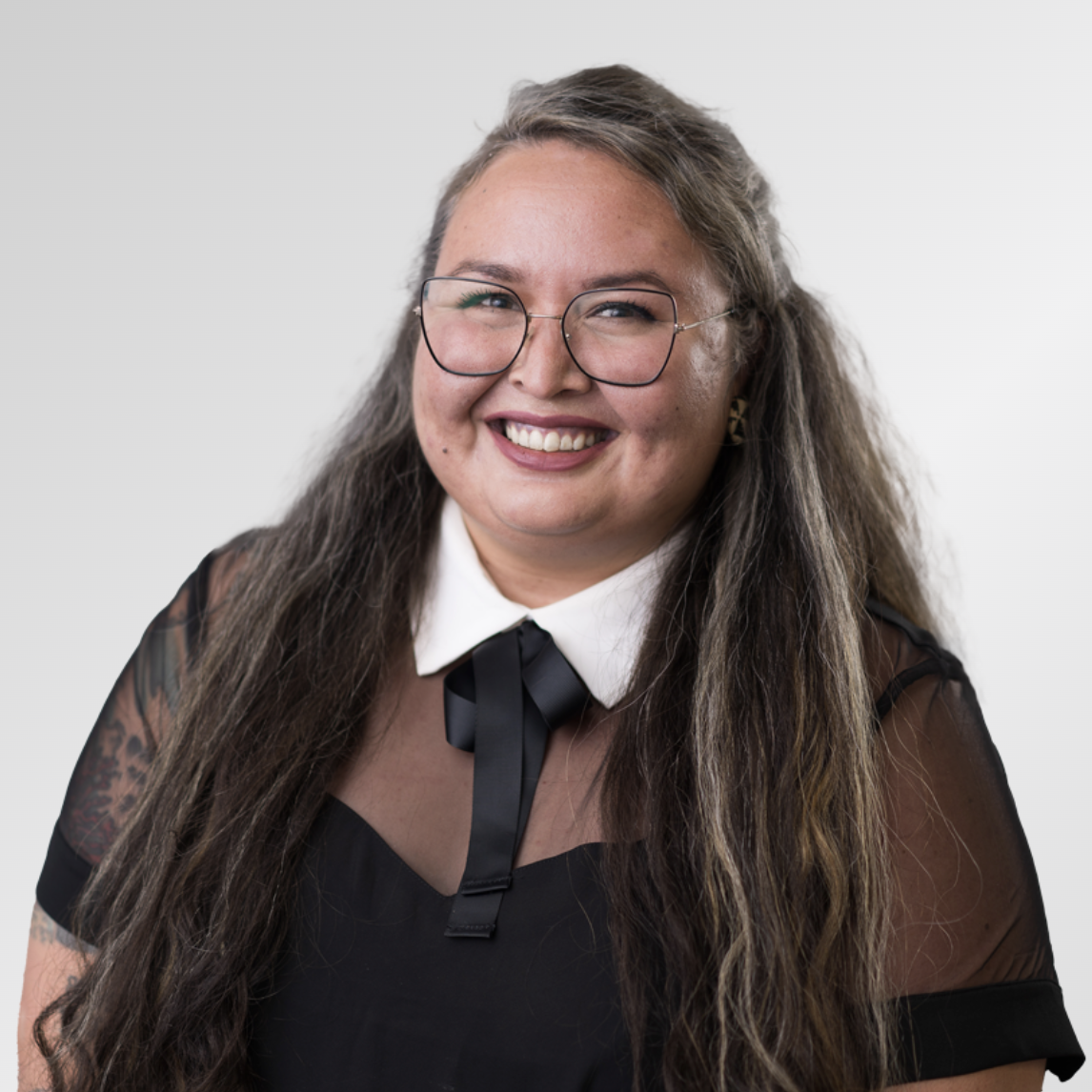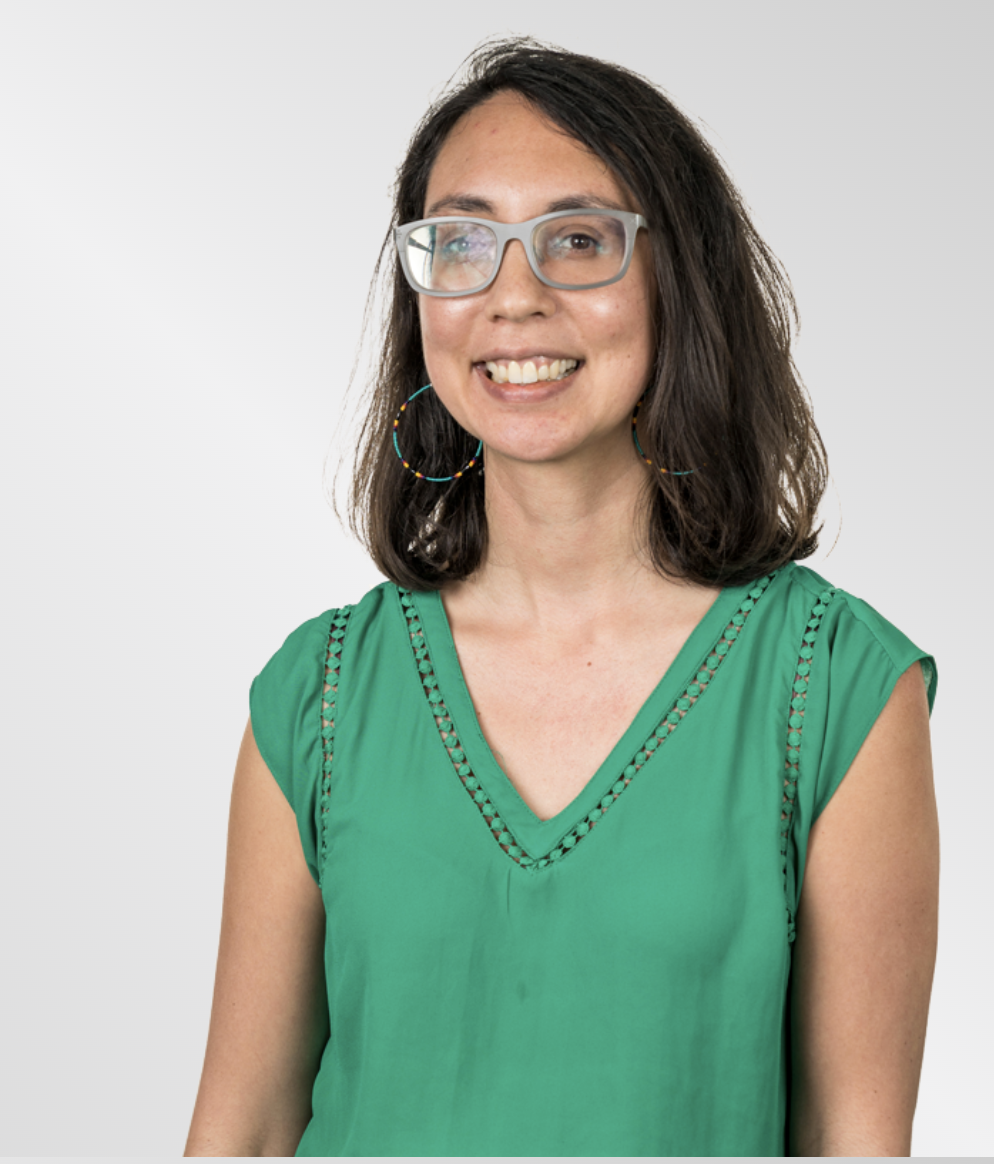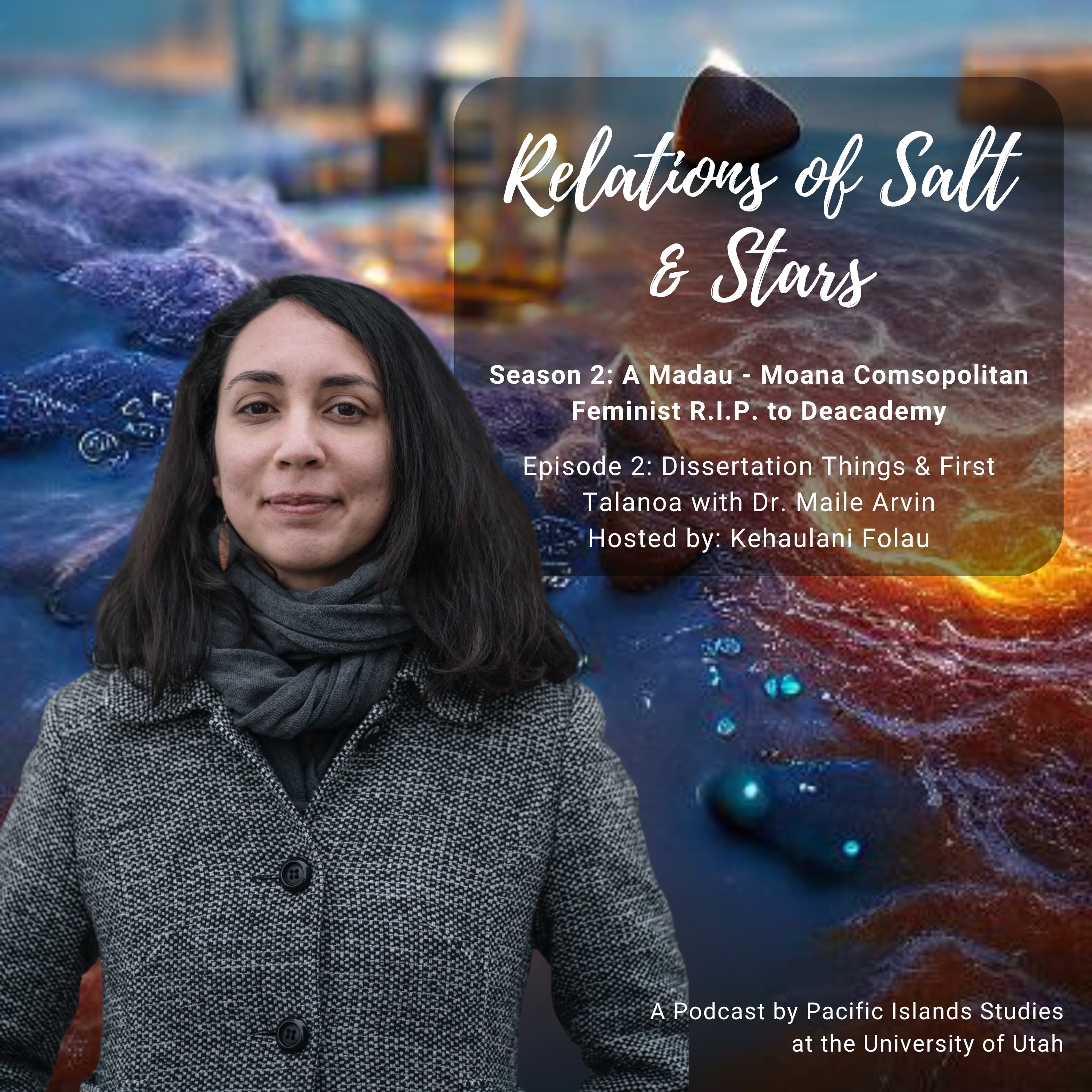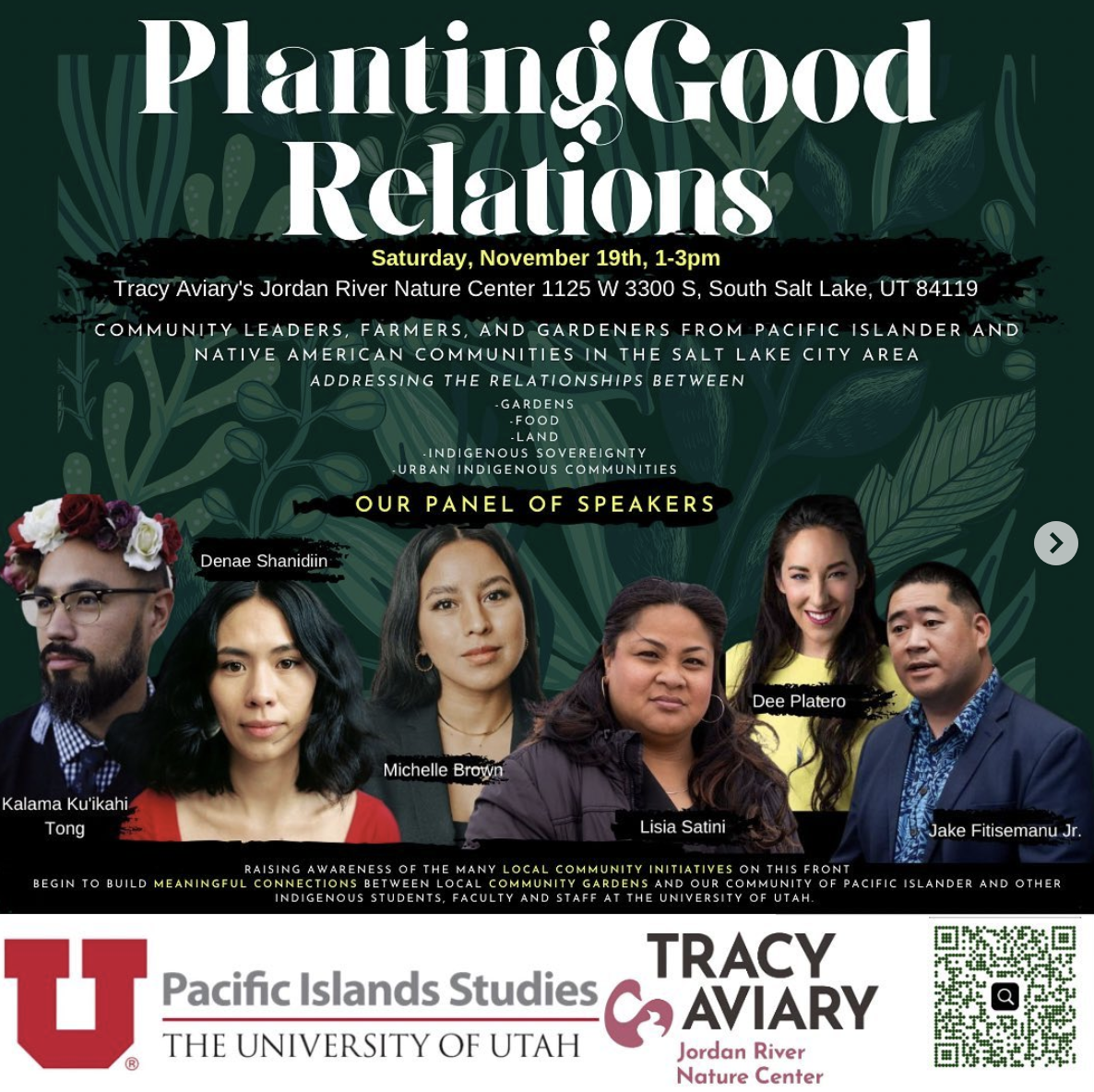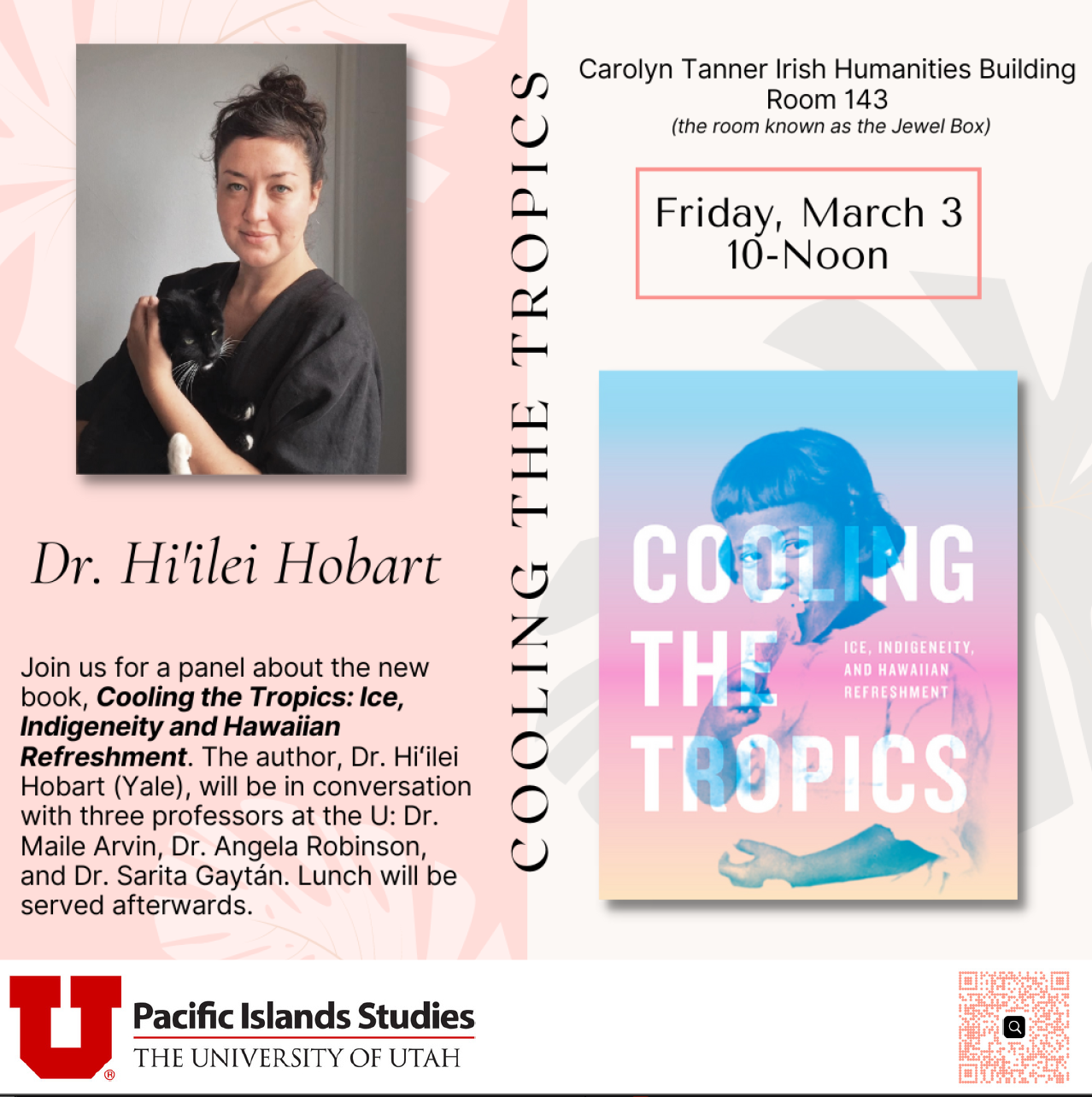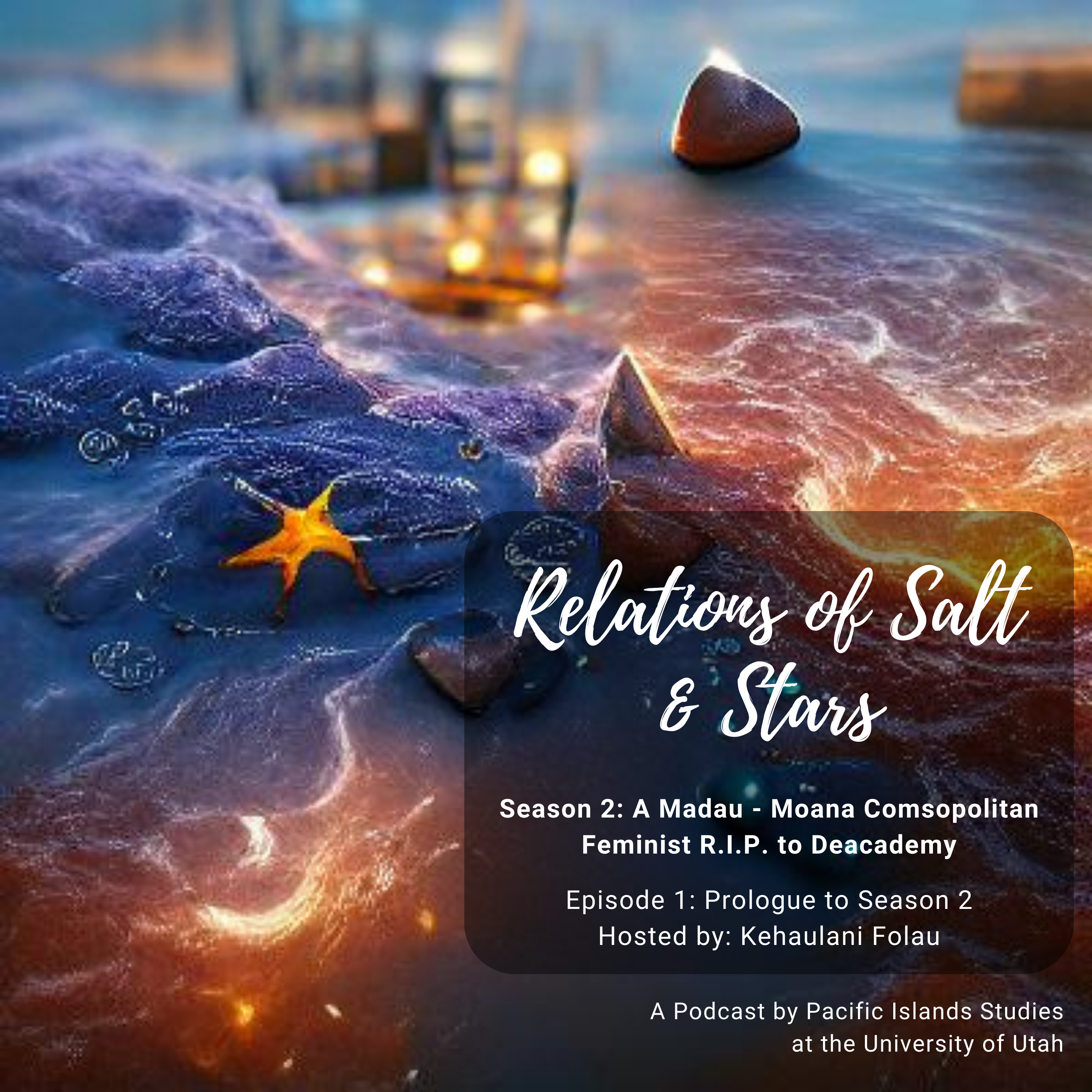Episode Transcript
Podcast Intro
Angela: Our ancestors traveled through salt and stars, and so do contemporary Pacific Islander communities today. In this podcast, we consider how to build good relations - with the communities we come from in Oceania, the communities we live with here in the Salt Lake City area, and especially the Indigenous communities whose lands we live on.
Maile: As Pacific Islander people who live in Utah, we are nourished by the lands of the Ute, Goshute, Shoshone, and Paiute peoples. We are far from the ocean, but close to the salt water of the Great Salt Lake. We are far from the night sky over our home islands, but can look up and see the same stars.
Angela: Join us as we explore and build Relations of Salt and Stars.
Maile: Relations of Salt and Stars is a new podcast produced by the Pacific Islands Studies program at the University of Utah, and hosted by faculty members Dr. Angela L. Robinson (who is Chuukese) and myself, Dr. Maile Arvin (and I'm Kanaka Maoli or Native Hawaiian). With the name “Relations of Salt and Stars,” we invoke the ties historically forged between the Pacific Islands and Utah, as well as the ones still in formation.
Kehau: Kaselehlie. Malo‘elelei. Welcome to episode two of season two of Relations of Salt and Stars. I’m Kehau Folau, your host for this season, and in today’s episode, I’ll be sharing some of the background of my project, a bit about my theoretical framework, and methodology, and will wrap up with highlights from my first talanoa with Dr. Maile Arvin.
To recap our last episode - I spoke a bit about the purpose of my research project, and put out a shameless call for participants. My project, A Madau-Moana Cosmopolitan Feminist R.I.P. to Deacademy, centers my positionality as a Pohnpeian-Tongan student, and asks how decolonial spaces are created and sustained in the academy within the context of the U.S. empire. My use of Madau-Moana comes from how my parents refer to our Ocean - Madau is Pohnpeian for ocean, beyond the reef, and thought; and Moana is the Tongan word, and a word used throughout Polynesia, for ocean and deep blue.
To share more context of the background of my project, I recognize that modernity is dying, and its promises of growth and prosperity have not only encountered the limits of the planet but the various crises around the globe have revealed capitalist greed and colonialist dispossession (Andreotti, 2021; Grande, 2021), and so I question how we let modernity’s darker side, coloniality also die, while we care for the land, waters, skies, the more-than human and each other.
I argue the academy is a production site of coloniality, which is emphasized in Craig Wilder’s book, Ebony and Ivy: Race, Slavery, and The Troubled History of America’s Universities. He traces how “the academy never stood apart from American slavery rather, it stood beside church and state as a third pillar of a civilization built on bondage.” Dr. Sandy Grande extends Wilder’s work to theorize the university as an arm of the settler state that perpetuates the logics of elimination, capital accumulation, and dispossession. Grande also speaks to hospicing the university, and so, what my research aims to highlight is the influences of Oceanian feminist epistemologies and pedagogies in creating decolonial spaces within the academy that delink from colonial logics, and work towards remembering and birthing pathways that “reproduce larger kinship networks of relation meant to disrupt the erasure of Indigenous cultures and lifeways” (Vaughn, 2022, p. 149).
In our last episode, I made a call to teachers and students of Oceanian feminisms to talanoa with me about their educational experiences and the influences of Oceanian feminisms on their work and I definitely feel blessed to have engaged with so many generous, amazing folks. Before I highlight clips from my first talanoa with Dr. Maile Arvin, I want to share a bit about my theoretical framework and methodology. My theoretical framing for this thesis is guided by tāvāism, a Tongan school of thought focusing on time-space and social connectivity (Ka‘ili, 2017; Tecun, 2019), and Moana Cosmopolitanism, a localized cosmopolitanism ancestrally rooted in the Moana and globally routed through various mediums including air travel and digital technologies with underpinnings of cultural relational ethics (Lopesi, 2021).
Epistemologically, tā-vā theory highlights how time and space are conceptualized differently across cultures and therefore, arranges time and space respectively (Ka‘ili, 2017). In other words, my interpretation of that is tāvāism as a place-based theory that accesses temporal mindfulness of spatial arrangements. Another tenet of tā-vā theory all things stand in eternal relations of exchange, giving rise to order or conflict. I pair these tenets to another tenet of tā-vā theory which is hoa. Hoa is defined as pairs, partners, a binary, dichotomy and duality (Ka‘ili, 2017; Tecun & Ka‘ili, 2020). I utilize hoa to highlight how colonial illogics govern our schooling system and how Oceanian feminisms collapse colonial arrangements of time-space and engage in knew ways of relating.
In Dr. Lana Lopesi’s (2021) dissertation, she coins Moana Cosmopolitanism which has offered me new pathways in thinking about my own experiences in and beyond the academy. First, it has allowed me to shift away from “deficiency and displacement narratives of diaspora” (p. 154) and to allow for the fluidity, complexities, and various possibilities of our Moana subjectivities, including the lived experiences of Moana Cosmopolitan faculty and their students. Within the context of the academy and stringent western standards, Moana Cosmopolitanism as an identity highlights the legacy of being ancestrally rooted in the Madau-Moana, locally rooted in new places, and globally routed both physically and digitally. This leads me to want to learn of their lived experiences, particularly within academia and the broader context of the crises of capitalist greed and colonialist dispossession. What I love about Moana Cosmopolitanism is it also offers a lens to view relational ethics of local cosmopolitanism that govern spaces of differences, including ideological differences.
A combination of tāvāism and Moana Cosmopolitanism sets the stage for my research of exploring the influences of Oceanian feminisms within the academy and highlights the process, described by Arcia Tecun by “where the act of temporal mindfulness and spatial arrangement produces an alignment, balance, equilibrium, which potentially reveals harmony or makes disharmony visible, whatever the truth between energies and relationships are” (2019, p. 49). They also allow me to highlight and focus on the underpinning ethics present in these moments of mediation.
And so, for my research, I utilized hohoko, a Tongan methodology of genealogy. Dr. Tēvita Ka‘ili has defined this as a research process that involves searching together through conversation for genealogical links, not only to get to know each other, but to identify family branches and linkages. In another co-authored article, Ka ‘ili talks about intellectual ancestors who created pathways by methoring them through their educational journey, or by influencing their worldviews through scholarship and research. In recognizing the importance of our intellectual ancestors, I’m also interested in our scholarly genealogies. Therefore, my use of genealogy works outside the colonial logics of direct heteropaternalistic biologized genealogies, and instead, points to an expansive-kinship-complex of people, land, ocean, and sky and the responsibilities we have to take care of these networks.
One of the research methods I’m using is talanoa, a practice used throughout the Moana and Oceania region. Commonly translated to talk story or dialogue, talanoa is often defined by two words, ‘tala’ meaning to tell or to talk, and ‘noa’ which has been defined as “anything or nothing in particular” (Vaioleti, 2006; 2013) and “balance, equilibrium, and zero” (Tecun et al., 2018, p. 159). You know, I was very nervous during most, if not all of my talanoa, and I questioned whether or not I was really doing talanoa because I was not sure if I was noa or ngofua, this idea of balance, was ever established. If anything, I’m grateful for those who participated for their generous answers and patience with me.
I’m excited to share some of my highlights of my first talanoa with Dr. Maile Arvin. To open my talanoa, I started with a Tongan proverb and common question, “ko hai ho hingoa?” This phrase translates to who is your name, instead of the common English translation of what is your name. In this, I asked to include both their familial and scholarly genealogy.
Maile: In Hawaiian, when you ask someone their name it’s “O wai kou inoa?” so you can hear the resonances in our Polynesian languages there. In Hawaiian, I would say if I was asked that question, I’d say, No Maile Renee Arvin koʻu inoa. No Kenekuke mai au. No Waimānalo koʻu ohana. No ho ao ma Utah. A he Polopeka au, make kolonui o Utah. Mahalo nui loa.
Hawaiians, probably like many other Indigenous peoples and other Polynesian peoples place a lot of importance on genealogies and self introductions. When you introduce yourself in Hawaiian, the first thing you say is like your full name and I was taught that you usually have to say your middle name, even if you don't like your middle name or if you never use your middle name, you better say it. Then also when you say- so I said No Kenekuke mai au, Kenekuke is Kentucky. So it's saying I'm from Kentucky but like I was taught that I probably wouldn't say I'm from Kentucky just if someone was asking me that in English but that's where I was born. So in Hawaiian, it's important to say pretty literally where you were born when you're introducing yourself. And then the next thing I said was my family's from Waimānalo which is a small town on the island of ‘Oahu and that's where my mom grew up. Her name is Wanda Leilani Arvin. Her maiden name was Awo. Her parents were- her dad's name was George Washington Awo and her mom’s name was Lillian Mahi Awo, or Lillian Kaehukai Mahi Awo. I think you can hear in my grandfather's name right, George Washington Awo, that my mom and her parents' generation grew up in Hawaii when Hawaii was a territory of the United States. My grandfather wanted his kids to be able to succeed in kind of the new state of Hawaii after Hawaii became a state in 1959. Even though he could speak some Hawaiian, he didn't speak Hawaiian to my mom and her siblings and he didn't want his mom to speak to his kids in Hawaiian either so that they would grow up speaking good English. That's my mom's side. My dad's name was Tracy Arvin. He didn’t have a middle name. He was born and grew up in Kentucky. My parents met in Waimānalo at the Bellows Air Force Base, where my mom worked in high school at the snack bar and told that she made him breakfast and that’s where they met. They met in Hawaii but eventually she moved to Kentucky to be with him, and they got married in Kentucky and that's how I was born in Kentucky. And yeah, that's my family.
Let’s see, my more scholarly genealogy- so, I went to the small liberal arts college for undergraduate, Swarthmore College and I think it was- it's part of my genealogy and the sense that I think it provided me a really strong education but mostly like, it opened up a lot of critical avenues to me. It got me really interested in academic writing and scholarship and research, even though I think almost none of my classes at Swarthmore actually addressed the Pacific or Hawaii. I majored in English literature there but I think I couldn't really imagine going to grad school in English literature because my classes there were on Shakespeare and Victorian literature and I really loved all of that. I mean, I still think all of that can be really cool especially when you're looking at issues of race and gender and sexuality and those things but I couldn't really feel motivated to go to grad school in English to write more scholarship about Shakespeare. No shade on people who are doing that but that wasn't really for me. After undergrad, I worked for two years at a nonprofit in San Francisco on the Asian Pacific Islander Wellness Center and they do HIV aids work for those populations. They do research and outreach and actual like healthcare and things. I was a program assistant or like a secretary type person for their research programs. I really appreciated the work that they did but I think I also from that experience just had a lot of questions about how Asians and Asian Americans and Pacific Islanders got grouped together and like why all the Pacific Islanders at our organization were in the lowest paying jobs, you know we were the secretaries and the receptionist and would be asked to like perform or dance at events, but you know we're not part of the leadership of the organization. I think that experience really made me more curious about those things and led me to applying to ethnic studies graduate programs. I didn't know anything about Graduate School at that time. I mean, I now know that I should have asked a lot more people about the process and like where I should have been applying. I just applied. I wanted to stay in California so I just applied to three programs in California and I got into UC San Diego ethnic studies and they had their best financial package so that's where I ended up and luckily for me, even though, like I said I did not know very much about any of this, there were already two Pacific Islander graduates students in that program: Madel who is Palauan, and Miget Bevacqua who’s CHamoru. It was really great to have them there and be mentored by them and then I was also, even though I think I had made some of these connections before but had never been in a space where there were kind of cross Indigenous connections being made and so there were also a lot of, or maybe not a lot, but there was my someone who became one of my good friends, Angie Morrill, who's Klamath Modocan. She really recognized me as another Indigenous person and another Indigenous scholar and I think it made all the difference that all of those people were there and helped introduce me to Indigenous studies as a field. I think we helped each other kind of work through the ways that ethnic studies and Indigenous studies are complementary fields but also not the same and sometimes ethnic studies hadn't done justice to kind of the particulars of Indigenous peoples’ situations. So I was at UC San Diego and then yeah I think especially through being friends with Angie Morrill, I got more interested in Indigenous feminisms and I think at some point, you know we started to go to conferences together: the Native American Indigenous Studies Association (NAISA) was formed I think that same year that I started grad school in 2007. So I wasn’t at that very first meeting in Oklahoma but I was at a lot of the meetings that happened after while I was in grad school. Through those networks, you know, kind of connected with other Indigenous studies or Indigenous feminist identified scholars like Eve Tuck and Audra Simpson and Mishuana Goeman.
The context of kind of cross Indigenous relationships look different and different sites across the world but also across like the continental US. I think I was just really lucky to be at UC San Diego at a time where there were both other Pacific undergrad students and Native American grad students who were interested in making those connections. And I know that that's not the case everywhere but I think there's a lot of value and making those connections and those relationships and so yeah, I think some of the the scholars that I felt most mentored by like in the beginning were Native American feminist scholars and slowly through as I continue to do my research and writing then I met more other Pacific Islander scholars like Teresia Teaiwa, who is always just so welcoming and amazing even to baby grad students like me, and like Alice Te Punga Somerville, Michelle Erai and yeah I think but I don't think I would have been in spaces where I could meet them if I hadn't have that network of other grad students and then the pre-existing mentorship by Native American feminists scholars like Mishuana Goeman and Audra Simpson and those folks.
Kehau: From the beginning, I love how Dr. Arvin highlighted the resonances between our languages, as well as the importance of genealogy and introductions. The shared protocol highlights the significance and power in our names and place. I also love hearing the connections made and relationships had throughout Dr. Arvin’s educational journey - it was actually Arvin, Tuck and Morrill’s article on decolonizing feminism that was a starting point for me to question academic participation in Indigenous dispossession. To hear how Dr. Morrill and Maile were friends in grad school is amazing to think about, as well this existing network of Indigenous scholars.
Another clip I want to highlight is when I asked Maile if there were any formidable moments that shaped the type of educator she is now. There are a few moments, so let’s begin with the first.
Maile: I've talked about the importance of like relationships and generosity from scholars who were a little ahead of me and I think my practice has been to try to repay you know kind of emulate that and pay it forward. I think that is I haven't talked about this part yet but I think that's also from like some bad experiences of you know I think in the academy because it can be so kind of hostile to people of color and women of color and many other kinds of people who are not white straight men, I think sometimes you like are expecting someone who might share some characteristics with you, you know like other Pacific Islander scholars or other female scholars or feminist scholars and kind of, you might have an expectation about how they interact with people but then it doesn't turn out that way because you know some people they get invested in the hierarchies of the academy and you know and maybe this I mean this is a kind of trauma response that and sometimes when people have faced a lot of shit from their own experience then their responses to pass on that cruelty or violence to other people, maybe consciously or unconsciously, but it's it's kind of like, “well I went through this so like you should go through this too.” You know, things like that. So, I won't get too specific because our world is very small but I think kind of witnessing that or experiencing things like that, I think like that's something I talked about with my friends a lot, is like how did certain people get to be like that where they like perpetuate a lot of the racist or sexism that that people of color experience in the academy even though they are themselves a person of color right. How could we make sure that we don't do that ourselves like to other other scholars of color and yeah I mean I go I guess I guess it's like an ongoing open question that I think we're always asking ourselves like ohh like I hope I'm not getting to be like that, you know or like, this happened to me like and I'm trying to figure out what to do like how can I be sure that I'm not like passing on the trauma of the academy to other people. I think we all have like a very deep desire not to perpetuate like the some of the violence that's inherent in the academy and I don't think there's like I think we all are trying not to do that but are also aware that it's very possible that we could pass that on but we we're trying really hard not to and I think we're trying to help each other do that.
Kehau: I’m not surprised at all that throughout Maile’s response are refusals that are guided by ethics of care. The line of questioning and reflection of how not to “pass on the trauma of the academy” not only resists traditional norms of the academy, including notions of rigor and academic standards, but also refuses to perpetuate the violence inherent in the academy. I’m blessed to have my dissertation chair, Dr. Kehaulani Vaughn, who is also so generous and who cares for me as a person. I find it no coincidence that Maile also served on Dr. Kehau’s dissertation committee, and the continuation of these ethics of care being carried on to the next generation of students.
I want to highlight another formidable moment that also highlights the relationship between refusals and care.
Maile: I first encountered Haunani Kay Trask’s work as an undergraduate, maybe a little earlier, but when I really remember it I maybe I've told you about this story before but um yeah so I was an undergrad at Swarthmore, which is in this small town in Pennsylvania and I have this one Asian American history class and there was one week in that class on Hawaii and I was like very excited you know it's like the one week of my college career that we're going to focus on Hawaii. One of the readings that was assigned was Haunani Kay Trask’s essay “Lovely Hula Hands”, which is in her book From A Native Daughter and so I read it and underlined it and was very excited to come talk about the history of colonialism and tourism in Hawaii. I came to class and you know, like I said I'm generally introverted and especially as an undergrad. I figured it out more as a grad student but as an undergrad, I didn't really like to talk in class. It took a lot for me to talk in class but I was very excited and ready to try to talk in class about this book that meant a lot to me and I came to class and then the whole discussion got overtaken by this one white male student who was just so offended by Haunani Kay Trask’s essay and so the essay ends by you know it's all about the history of tourism and colonialism in Hawaii and the negative impacts that tourism has had on Hawaiian culture and especially on Hawaiian women who are come to be seen through these systems as you know exotic, sexualized, objects for white men and so at the end of her essay she says something like if you really want to be an ally to native Hawaiian people, don't come to Hawaii. Do not come here and participate. Don't come on vacation here don't participate in the tourism industry right and this other student he just made the whole class about that and about his right to go on vacation in Hawaii because Hawaii is part of the United States and nobody can tell anybody where they can't go and you know so on and so on and I was just so like devastated and you know at that point it didn't really have the language or the confidence to like counter that student. And now thinking about the this now I think you know as a student I was just really mad at that other student but now I'm really mad at the teacher because like what was the teacher doing like why are the teacher let this whole class get taken over by this one angry student and I guess when I like speaking of like I guess formidable experiences about how I think about being an educator right is like I promised myself that I would never let that happen to students in my classes right where one of the loudest student who has like the most feelings about something gets to dominate the discussion when there are other students in the class that clearly have deep stakes in whatever we're talking about and the students with the stakes should feel just as comfortable talking in the class as the students who might have a lot of opinions but actually don't have the same stakes or genealogical ties to the peoples or the context that we're talking about.
Kehau: I was also an undergrad when I first encountered Haunani-Kay Trask’s work, and was assigned to read the same chapter, “Lovely Hula Hands.” I think I would be devastated too if my teacher allowed a student to monologue his hurt feelings. Something I absolutely loved about what Maile shared is when she said, “I promised myself that I would never let that happen to students in my classes.” To me, this is so impactful because I can recall various times where either white or male fragility was at full display in a classroom, and me looking at one or the two other students of color thinking, what is happening. I remember during my undergraduate years, I wouldn’t even bother to engage in hopes to save my energy. It wasn’t until later when I gained the confidence and language to speak back but even then, I think it was done clumsily resulting in someone walking out of class or crying. And so, the refusal to let the fragility of privileged identities consume the classroom, and instead to create an environment where marginalized students feel comfortable to talk, informs me of how I’d like to lead a classroom.
And so, as I reflect on my own goals of how I’d like to lead a class, or how I’d want to mentor students, I want to end this episode with this last question. I ask Dr. Arvin to share her goals of taking part in the academy as an Indigenous feminist.
Maile: The project that I'm really invested in right now is my research on the history of reformatories and training schools, industrial schools in Hawaii. I came to that project in part because my Tutu, my grandmother, worked at a girls school at a later period than what I'm studying but that's how I came to know about it and I'm really interested in how these schools functioned in ways that are similar to Native American boarding schools. Many of the schools that I'm studying were named in the federal report on Indian boarding schools that came out in 2022 and I think this project, you know my first book, I like my first book very much and also this project it's just kind of more it has to be more community engaged than my first book because you know my first book was a large part in large part kind of looking at the intellectual history of race in Hawaii and Polynesia and so that involved a lot of like you know archival researcher looking at the writings of Europeans or Americans about race in the Pacific which again I think it's important but this project kind of necessitated me learning more about how to do community engagement research because for many reasons that we probably can't get into all here but many of the institutions that I'm studying still exist in some form like the former boys school, kind of the ruins of the buildings are still standing, it's still very very visible from the highway but then the school that my grandmother worked at that was the former girl school, it's still today I juvenile detention facility and so it has never stopped to being a facility to incarcerate children since it opened in 1929. There's not been very much scholarship or I guess hardly any, maybe there is one whole dissertation about these places, but I think it's something that's really important to Hawaiian history that more people in Hawaii deserve to know about and so that's necessitated me figuring out then how do I make this or you know how do I share their research that I'm doing with people more immediately than waiting years for a book to come out or you know, things like that and I guess a goal without publication kind of learning how to sincerely engaged with community folks who have stakes in this history and work with them collaboratively to produce different kinds of outcomes, besides, you know I have to write an academic book for my job and I like writing academic books and, you know I think there's value in academic books and, what are the kinds of outputs or other kinds of ways to get out information about this history about community folks who aren't in the academy might find more useful. Through that process, we’re trying to figure out how to do story maps and build a website and a digital archive and Kinny’s helping me with all of this, which is very wonderful. That's one thing that I thinking about a lot these days, how to the bridge some of the more academic parts of my job and really engage with a more engage community-facing, collaborative kind of research work which I'm still very much learning how to do but I think one of the things that's intimidating perhaps sometimes about working with communities, outside the academy is that it takes a long time to build relationships and to build trust and authentic connections and things and I think eventually I realized like actually like things that academia take a long time like and so like it's fine that that takes a long time to like build this relationships with community, and like but I mean I've seen this all like after about tenure too so that's where the deuces some of the academic pressure but but I think once they started to like think like well like academic publishing takes a long time and community engaged work takes a long time so like how could they think about those things as like actually a positive thing that those take a long time and we could I could do them together. That's one thing I think about and then yeah I mean another thing that I'm doing with both of you right is to think about how to build Pacific Island Studies at the University of Utah, you know Monday I present our proposal for the Center for Pasifika Indigenous Knowledges to the universities academic senate and see if they approve it or not and that's one of the last major hurdles before our center might be approved and yes I think another kind of goal really with that is is kind of continuing from what we've been talking about today is like how not to be the only one, how not to be the only Pacific Islander scholar in the field or at this university but one of the things I would like us to do with the center because it kind of builds in more professional development for other Pacific Islander scholars which you know could look a lot of different ways like just again like trying to build some support networks for Pacific Islander scholars, especially if they're isolated and they're the only ones at their institution there are ways we could you know leverage, even just like meeting having things on zoom and connecting over zoom or whatever and like demystifying the academic tenure process or you know things like that but like from from a Pacific Islander perspective which I think would be really nice for everybody to just to kind of extend some of the work we've been able to do together here in person like to more more and more people in our field nationally and maybe even internationally.
Kehau: I wanted to end with these goals because they highlight the importance of community and family. For Maile to be led to her current research project because of her Tutu, I think speaks to the mana of the women in our family and the influences of their teachings on not only our scholarly work, but the work we care so deeply for. And these ethics of care continue in her community-engaged work, and work on campus. Something that has happened since our talanoa is the academic senate has approved The Center for Pasifika Indigenous Knowledges. I’ve been on this campus since 2008, either as a student or staff, and am grateful to have witnessed this growth before graduating.
My eternal gratitude to Dr. Maile Arvin! Truly, thank you so much for all your support during this process! Thank you for your research, your scholarship, and your continued work in and beyond the academy.
